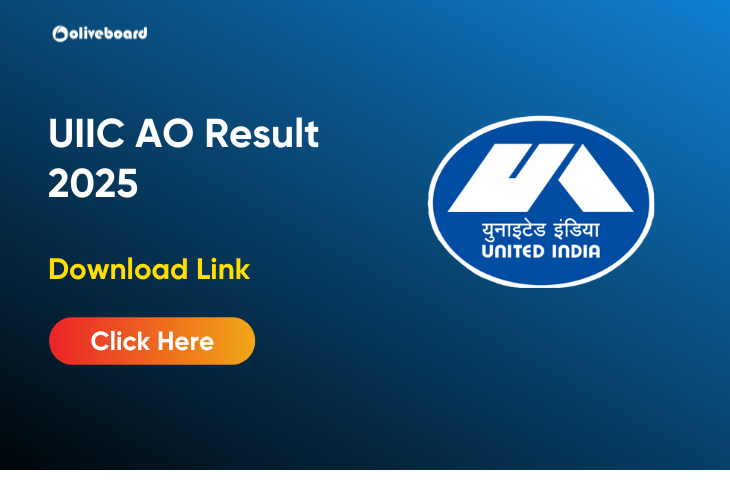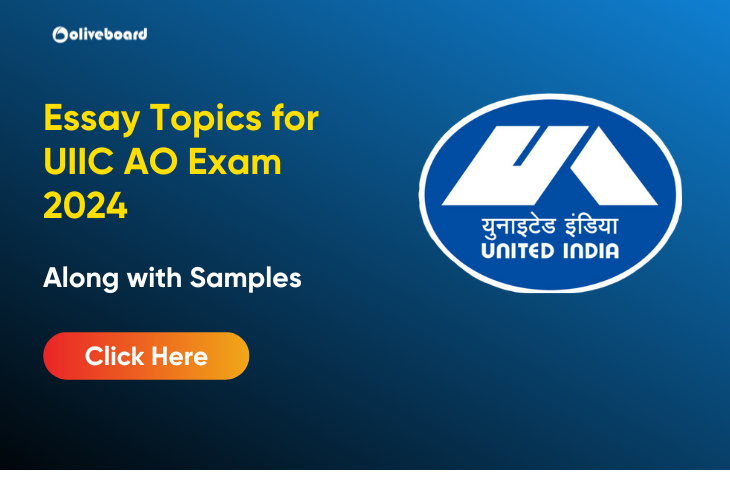Essay Topics for UIIC AO Exam 2024: The UIIC Administrative Officer (AO) examination is a prestigious opportunity for aspiring candidates in the insurance sector. Among its various sections, the essay writing component tests candidates’ ability to express their views clearly and persuasively on relevant topics. To help candidates prepare, here’s a curated list of important essay topics for UIIC AO Exam 2024, including contemporary issues, global trends, and sector-specific challenges.
Essay Topics for UIIC AO Exam 2024
Here are some of the most relevant and thought-provoking topics to help you prepare for the essay section of the UIIC AO Exam 2024. Focus on these areas to showcase your analytical skills and understanding of contemporary issues.
National and Developmental Themes
- Amrit Kaal and the Role of Youth in Shaping a New India
Exploring the vision of a vibrant India driven by its young population. - One Nation, One Election: Pros and Cons
Analyzing the feasibility and implications of synchronizing elections. - Uniform Civil Code: Relevance and Challenges
Examining its impact on social harmony and legal uniformity. - Financial Inclusion and the Role of Banks in Promoting Financial Literacy
Strategies for making banking accessible to underserved populations. - India as the Emerging Global Power
Assessing India’s potential to lead on the global stage.
Technology and Innovation
- Artificial Intelligence: Importance and Challenges
The dual-edged sword of AI and its role in shaping industries. - AI’s Potential to Transform India
Opportunities in healthcare, education, and governance. - Role of Technology in Enhancing Education
The impact of EdTech on learning outcomes. - Digital Currencies: Opportunities and the Government’s Stance
Evaluating the potential of digital rupees and cryptocurrencies. - Fintech Sector: Revolutionizing the Economy
Innovations in the financial sector and their societal impact.
Environmental Concerns
- Climate Change and Biodiversity Loss: Impacts on Human Life and the Financial Sector
Addressing the intersection of environmental and economic risks. - Deepening Climate Crisis: A Call for Action
Global and local strategies to combat climate change. - Delhi’s Air Pollution Problem: Solutions and Strategies
Identifying practical measures to improve air quality. - Life in Plastic: Waste Management Frameworks
Tackling the growing challenge of plastic waste.
Social and Cultural Issues
- Women Empowerment: Importance and Challenges
Bridging gender gaps in education, employment, and leadership. - Addressing Mental Health Issues Among Youth
Fostering awareness and accessible healthcare solutions. - War is Never a Solution: Peace Through Understanding
Promoting global peace initiatives and conflict resolution. - Global Terrorism: Strategies to Tackle It
International cooperation in combating terrorism.
Economic and Financial Topics
- G20 and Its Economic Importance
Insights into the role of G20 in fostering global economic growth. - The Role of Startups in Driving Economic Growth
How innovation and entrepreneurship fuel economic progress. - Bank Mergers: Benefits and Potential Risks
Assessing the impact of consolidating financial institutions. - Silver Economy: Importance and Challenges
Economic opportunities in catering to an aging population. - The Growing Importance of Health Insurance
Strengthening healthcare access through insurance reforms.
Other Significant Topics
- Space Economy: Opportunities and Challenges
Leveraging space exploration for economic development. - Importance of Digital Public Infrastructure
Building robust frameworks for governance and service delivery. - Dual Regulation of Indian Banks: Benefits and Challenges
A critique of RBI and SEBI’s regulatory overlaps. - Humans vs Machines: Collaboration or Competition?
Rethinking human roles in an increasingly automated world. - Cashless Economy and the Digital India Movement
Progress and challenges in transitioning to a digital economy.
Additional Topics to Explore for UIIC AO
- India’s Renewable Energy Targets: Progress and Challenges
- Navigating the Post-COVID Economy
- The Importance of Ethical Leadership in Governance
- Impact of Social Media on Democratic Processes
- Cybersecurity Threats in the Age of Digital Transformation
UIIC AO Essay Sample
Here are samples of some essays for UIIC AO.
Essay 1: The Role of Startups in Driving Economic Growth
Introduction:
Startups play a pivotal role in shaping the modern economy by fostering innovation, creating employment, and promoting technological advancement. With India becoming a global hub for startups, their contribution to economic growth is significant. These entrepreneurial ventures act as catalysts for economic transformation, addressing societal needs with novel solutions.
Body Paragraph 1: Contributions of Startups to Economic Growth
Startups drive job creation, especially in sectors like technology, e-commerce, and fintech. For example, India’s startup ecosystem generated over 6 lakh jobs in 2023, according to the Ministry of Commerce. Moreover, startups often lead to innovations that improve productivity across industries. Companies like Ola and Zomato have revolutionized urban mobility and food delivery, significantly boosting related industries.
Startups also attract foreign investments, bolstering the country’s economic reserves. In 2022, Indian startups received approximately $44 billion in venture capital funding, showcasing their global appeal. This inflow of capital not only strengthens the financial ecosystem but also enhances the country’s standing in the global market.
Body Paragraph 2: Challenges and Solutions
However, startups face significant challenges, such as regulatory hurdles, lack of infrastructure, and funding gaps. According to Nasscom, over 70% of startups struggle to scale due to limited access to funding.
To address these challenges, the government has initiated programs like Startup India, which offers tax benefits, reduced compliance, and funding support to budding entrepreneurs. Strengthening the collaboration between private investors and public institutions can further bridge these gaps.
Conclusion:
Startups have become integral to India’s economic narrative, driving innovation and creating substantial economic value. By overcoming obstacles through policy reforms and enhanced support, the startup ecosystem can continue to flourish, ensuring robust economic growth.
Call to Action:
It is essential to cultivate an environment that nurtures entrepreneurial ventures, encouraging innovation and collaboration. A thriving startup ecosystem is not just a boon for the economy but also a step towards building a self-reliant nation.
Essay 2: Artificial Intelligence: Importance and Challenges
Introduction:
Artificial Intelligence (AI) is transforming industries globally by enabling smarter decision-making, improving efficiency, and fostering innovation. From healthcare to finance, AI has revolutionized processes, making it an indispensable part of the modern economy. However, its rapid adoption presents challenges, such as ethical dilemmas, job displacement, and data privacy concerns.
Body Paragraph 1: Importance of AI
AI has immense potential to solve complex problems. In healthcare, AI-powered tools like IBM Watson assist in diagnosing diseases with higher accuracy. In agriculture, predictive analytics and AI-driven machinery optimize crop yields and reduce resource wastage.
AI also boosts economic growth. According to PwC, AI is projected to contribute $15.7 trillion to the global economy by 2030. Countries like China and the U.S. are leveraging AI to enhance productivity and competitiveness in various sectors.
Body Paragraph 2: Challenges of AI Adoption
Despite its benefits, AI poses significant challenges. Ethical concerns, such as biased algorithms, can lead to unfair outcomes, undermining trust in AI systems. For instance, facial recognition tools have shown biases in accurately identifying individuals from diverse ethnic backgrounds.
Job displacement is another pressing issue. As automation replaces routine tasks, workers in industries like manufacturing and customer service face unemployment risks. Moreover, data privacy concerns have intensified with AI systems processing vast amounts of personal information, often without adequate safeguards.
Conclusion:
While AI holds the potential to transform the world positively, addressing its ethical, social, and regulatory challenges is crucial. A balanced approach that prioritizes responsible innovation can maximize AI’s benefits while minimizing its risks.
Call to Action:
Governments, businesses, and researchers must collaborate to establish robust frameworks that ensure AI is developed and deployed ethically and inclusively. Only through collective effort can we harness AI’s potential for a better and equitable future.
- UIIC AO Descriptive Test Pattern For Essay and Letters, Preparation Tips

- UIICL AO Final Result 2025 Out, Download Merit List PDF

- UIIC AO Cut Off 2025 Out, Category Wise Previous Year Cut Off Marks

- UIIC AO Scorecard 2025 Out, AO Specialist Marks Link

- UIIC AO Admit Card 2024 Out, Call Letter Download Link

- UIIC AO Shift Timing 2024 For 14th December Exam


Hello, I’m Aditi, the creative mind behind the words at Oliveboard. As a content writer specializing in state-level exams, my mission is to unravel the complexities of exam information, ensuring aspiring candidates find clarity and confidence. Having walked the path of an aspirant myself, I bring a unique perspective to my work, crafting accessible content on Exam Notifications, Admit Cards, and Results.
At Oliveboard, I play a crucial role in empowering candidates throughout their exam journey. My dedication lies in making the seemingly daunting process not only understandable but also rewarding. Join me as I break down barriers in exam preparation, providing timely insights and valuable resources. Let’s navigate the path to success together, one well-informed step at a time.
